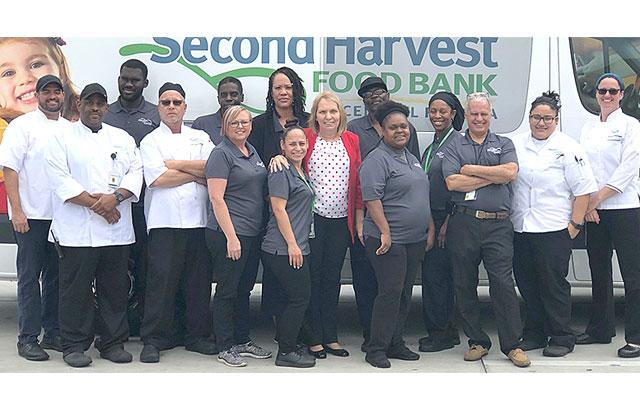New food programs underway this summer
Nancy Brumbaugh loves her job at Second Harvest Food Bank but struggles with why it exists in the first place.
As Vice President of Food Services, she oversees programs that connect hungry and malnourished men, women and children with sustenance, including a few new ones in Osceola County this summer.
Brumbaugh worked in food management for years at Orange County Public Schools, a grocery store chain and a restaurant. But after seeing two boys fighting over pancakes during school breakfast, she heard her second career calling at Second Harvest.
“I thought: There are people who don’t get enough to eat in America, you gotta be kidding me,” she said. “I made it my mission from that day forward to serve our community and our children, and bridge that food gap.”
More than 60% of families with children in public schools earn less than the federal poverty line in Osceola, making free school lunches and breakfasts, food pantries and drive-thru food giveaway events commonplace here.
The Osceola County School District is providing meals and snacks for thousands of kids at more than a dozen sites across the county until August as part of the longstanding USDA Summer Food Service Program.
The cost of living in Osceola exceeds what many here can afford, even working full time.
Many working families and individuals struggle to pay increasingly high rents, working in jobs where wages have stagnated. Even those earning $15 an hour only bring home $28,800 annually, and that’s working all 52 weeks of the year.
“A majority of folks in our area live paycheck-to-paycheck. They could start spiraling into poverty if their car breaks down or something else unexpected happens,” Brumbaugh said.
In Central Florida, one out of every five children go to bed hungry each night, and the same goes for one out of every seven adults, she said, citing hunger studies by the Feeding America Network and United Way of Central Florida.
The tourism and service industry shutdown at the onset of the COVID-19 outbreak put tens of thousands of Central Floridians — many from Osceola County — out of work, including both low-wage and high-wage earners.
“I think the pandemic taught us that in a blink of an eye you can become food-insecure,” Brumbaugh said.
Osceola’s unemployment rate was the highest in the state for several months over the past year, which has brought additional federal funding for food assistance programs to the county and the region. Donations from the community also have increased since the pandemic.
Second Harvest has innovated during the pandemic, expanding into food delivery, hot meal services, and teaching people how to cook and avoid fast food or empty calories.
“Buying a family dinner off the dollar menu or buying a pizza is common, because fast food, unfortunately, is cheap and many parents have now grown up eating it,” she said. “But those empty calories and carbohydrates and sugar drive our obesity problem in our country and end up costing us more in healthcare in the long run.”
About 14.4 million (20%) children ages 2 to 19 are obese, according to the U.S.Centers for Disease Control.
“Not only is it our mission to feed folks who are food-insecure, but we want to get them the right food to make sure they stay healthy and live well.” Brumbaugh said. “And especially for kids, they’ve got to have nutritious food to fuel their brains and bodies for learning and for good behavior.”
For more on Second Harvest’s summer food programs, go to www.food hopenow.org.
For more on the school district’s summer food programs, call 407-870-4600.




